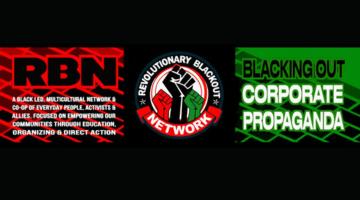by Norman (Otis) Richmond aka Jalali
If you don’t know about George Jackson, the Soledad Brother, then you have had a very incomplete education on the Black Liberation Movement. Assassinated by guards in San Quentin’s prison yard in 1971, Jackson is both an icon and theorist of the era. His younger brother, Jonathan, was martyred a year earlier seeking George’s escape, an incident in which educator and activist Angela Davis became enmeshed. C.L.R. James described the letters in Jackson’s book Soledad Brother as “the most remarkable political documents that have appeared inside or outside the United States since the death of [Vladimir Ilyich] Lenin.”
George Jackson: Forty Years Ago, They Shot Him Down
by Norman (Otis) Richmond aka Jalali
On August 20th, Kumasi, who is a central leader of the Black August Organizing Committee and who knew George Jackson personally, will be a guest on Norman Richmond’s Saturday Morning Live radio show, in Toronto, Canada, 10am to 1pm, www.ckln.fm.
“He was acclaimed throughout the world as the most powerful and eloquent black writer to emerge in years.”
August 21st will mark the 40th anniversary of the execution of George Lester Jackson (September 23, 1941-August 21, 1971). Many of the strategies and tactics that he and his fellow comrades employed in the late 60s and early 70s were used by prisoners at Pelican Bay, Corcoran, (CSP-COR) and other California prisoners in the recent uprisings.
Jackson was an African convict who became an activist, Marxist, author, a member of the Black Panther Party, and co-founder of the Black Guerrilla Family prison organization. He achieved global fame as one of the Soledad Brothers before his execution by prison guards in San Quentin Prison. George and his younger brother Jonathan Jackson and Khatari Gaulden are central to understanding Black August.
Jackson was an African born in America who became a Field Marshal of the Black Panther Party while in prison, where he spent the last 12 years of his life. His book of published letters, Soledad Brother, became an instant classic.
On August 7, 1970, George’s 17-year-old brother Jonathan burst into a Marin County courtroom with automatic weapons, freed three San Quentin prisoners and took Judge Harold Haley as a hostage to demand freedom for the three "Soledad Brothers." However, Haley, prisoners William Christmas and James McClain, and Jonathan Jackson were killed as they attempted to drive away from the courthouse. The case made international headlines. The state claimed that Judge Haley was hit by fire discharged from a shotgun inside the vehicle during the incident. The weapon was said to have been attached by wiring, tape, and/or a strap of some sort, and/or held beneath his chin. The shotgun was traced back to Angela Davis.
“George and his younger brother Jonathan Jackson and Khatari Gaulden are central to understanding Black August.”
Gaulden became the leader inside San Quentin after George Jackson was killed on August 21st, 1971. The Little Rock, Arkansas-born Gaulden was himself assassinated in 1978. The hit on Gaulden was the spark that led to the Black August prairie fire.
Gary Thomas, at that time a prosecutor (later a judge) who was also taken hostage and paralyzed by a police bullet during the incident, testified in a subsequent proceeding that: "The sawed-off shotgun was being held under Judge Haley's chin by Ruchell Magee. The shotgun went off. It was as if it was in slow motion--all outward features of his face moving away." Some accounts of the incident report that Judge Haley's head was taken almost completely off his body as a result of the blast.
Ruchell “Cinque” Magee, the sole survivor among the group who revolted at the court, was convicted for Haley's kidnapping and murder and sentenced to life imprisonment, which he is serving to this day in Corcoran. Now 71 years old, he has lost numerous bids for parole.
One year later in August 1971, three days before he was to go on trial, George was gunned down in the prison yard at San Quentin in what officials described as an escape attempt. On the day Jackson was murdered, August 21, 1971, this writer saw grown, macho men break down and cry tears bigger than cantaloupes. Jackson influenced a larger number of Africans-in-America and progressive thinking whites than can be imagined.
Jackson’s death sent Archie Shepp, Bob Dylan and Steel Pulse into the studio to record tributes to him. He was eulogized in jazz, pop and reggae idioms. “Jazz” man Shepp released “Blues for Brother George Jackson” on his Attica Blues album. Dylan did a single “George Jackson” and the British reggae band, Steel Pulse (who would later be invited to perform at President William Jefferson Clinton’s first inauguration in 1993) recorded two songs, “George Jackson” (a cover of Dylan’s song) and “Uncle George” on their 1977 album Tribute To The Martyrs. The group actually re-recorded ”George Jackson” and “Uncle George” on the 2004 album African Holocaust.
“Jackson influenced a larger number of Africans-in-America and progressive thinking whites than can be imagined.”
Jackson’s impact was so great that Warner Bros. film attempted to cash in on his image by producing a film, "Brothers," starring Bernie Casey and Vonetta McGee. The soundtrack was performed by Taj Mahal. I saw the film in Memphis, Tennessee. There was only an elderly Euro-American couple and myself in the theater that day. At that time, I was slippin’ into darkness (I was underground).
Who was George Jackson and why eulogize a “convict”? When Jackson was eighteen, he was sentenced from one year to life for stealing $70 from a gas station. He spent the next eleven years in prison, eight and a half of them in solitary confinement. When he was twenty-eight years old, he was charged with the murder of a guard in Soledad prison. Shortly after his indictment for this murder, his first book, Soledad Brother, one of his personal letters, was published in England, Germany, Italy and Sweden. He was acclaimed throughout the world as the most powerful and eloquent black writer to emerge in years. He became a symbol for the struggle of all oppressed people.
Commenting on Jackson’s writing, C.L.R. James pointed out, “The letters are in my opinion the most remarkable political documents that have appeared inside or outside the United States since the death of [Vladimir Ilyich] Lenin.” The late Walter Rodney used to talk about how it was amazing that Jackson could develop an international consciousness from a prison cell. Rupert Lewis, who wrote the book Walter Rodney's Intellectual and Political Thought, found an essay that Rodney had written about Jackson while he lived in Tanzania.
“The commitment to total revolution must involve an analysis of both the economic motives and the psychosocial motives which perpetuate the oppressive contract.”
George Jackson continued to make news even after his death. When Stanley "Tookie" Williams was executed on December 13, 2005, California Governor Arnold Schwarzenegger invoked Jackson’s name as one of the reasons that the co-founder of the Crips should meet his maker. Governor Schwarzenegger said:
"The dedication of Williams' book Life in Prison casts significant doubt on his personal redemption.
“This book was published in 1998, several years after Williams' claimed to a redemptive experience. Specifically, the book is dedicated to 'Nelson Mandela, Angela Davis, Malcolm X, Assata Shakur, Geronimo Ji Jaga Pratt, Ramona Africa, John Africa, Leonard Peltier, Dhoruba Al-Mujahid, George Jackson, Mumia Abu-Jamal, and the countless other men, women, and youths who have to endure the hellish oppression of living behind bars.' The mix of individuals on this list is curious. Most have violent pasts and some have been convicted of committing heinous murders, including the killing of law enforcement."
Jackson’s second book, Blood In My Eye, was completed only days before he was killed in the alleged escape attempt from San Quentin. Blood In My Eye clearly showed Jackson’s global outlook. He wrote, “The commitment to total revolution must involve an analysis of both the economic motives and the psychosocial motives which perpetuate the oppressive contract. For the black partisan, national structures are quite simply nonexistent. A people without a collective consciousness that transcends national boundaries—freaks, Afro-Amerikkkans, Negroes, even Amerikkkans, without the sense of a larger community than their own group—can have no effect on history. Ultimately they will simply be eliminated from the scene.”
Kumasi and Chaka of Los Angeles and Oakland, respectively, recently appeared on Saturday Morning Live in Toronto. Both knew George and served time in California dungeons. They represent the Black August Organizing Committee whose mission it is to attempt to help prisoners such as Hugo “Yogi” Pennell, Ruchell McGee and countless others still languishing behind California and other prison walls in the United States. For more information on this organization contact http://www.dragonspeaks.org. Mumia Abu-Jamal has done several outstanding commentaries about Black August. To listen to these thought provoking messages go to http://www.prisonradio.org
Norman (Otis) Richmond aka Jalali can be reached at [email protected].









